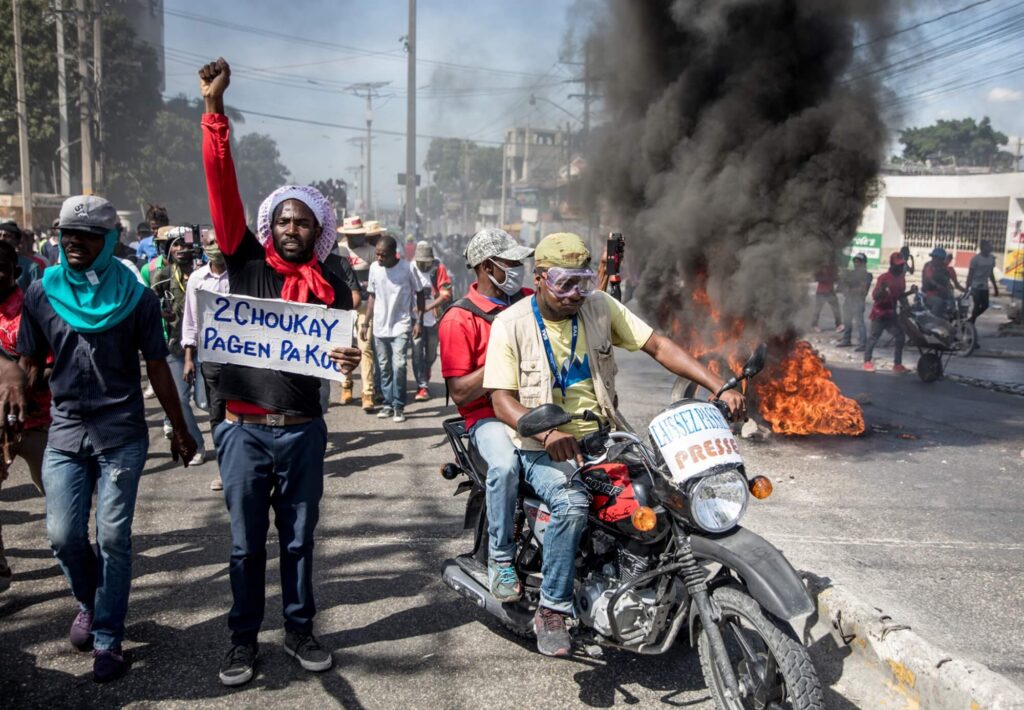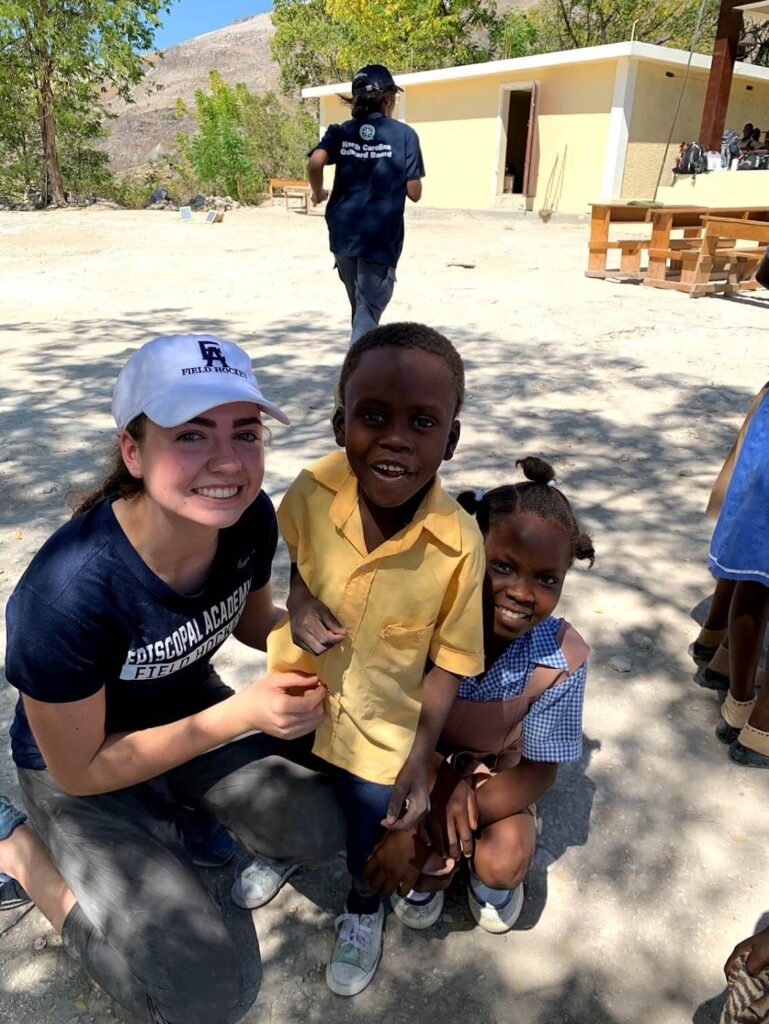Bridget Murphy ‘25
EA’s annual trips to Haiti stopped in the Spring of 2020 due to COVID-19, and as political unrest grew, the trips had to be canceled in the following years. EA has been able to continue financially supporting Saint Marc’s School in Cerca, Haiti, but as of now, there are no updates regarding when the trips will begin again.
In 2010, Haiti experienced its worst earthquake in 200 years, destroying much of its capital, Port-au-Prince, and killing more than 200,000 people. According to CBS News, Port-au-Prince was still recovering from two tropical storms and two hurricanes in 2008. The city, already strained by inadequate infrastructure, was unprepared for the disaster. According to Haitian journalist and activist Monique Clesca, during the chaos of the aftermath, many gangs emerged working with politicians. She explains, “The gangs became empowered, the gangs were validated, armed, et cetera, by the economic and the political elite.”

Photo courtesy of The New York Times
EA’s relationship with Saint Marc’s began in 2012 when the larger Episcopal Church started a program to match schools in Haiti with schools in the United States. Becky Brinks, Community Service Coordinator, explains, “The Episcopal Church has a pretty big presence in Haiti and they matched churches and schools in the U.S. with communities and churches in Haiti to offer support, fundraising, and a community connection. All throughout the US, there are different churches and schools that are partnered with schools in all different parts of Haiti. The Episcopal Diocese came to EA when Ham Clark was Head of School and said ‘we are doing this program, would you take on a school.’”
In 2020, Jimmy Chérizier, a former Haitian police officer, brought together several gangs in Port-au-Prince, forming the G9 Family and Allies Confederation. Following the assassination of Haiti’s President Jovenel Moise in 2021, Ariel Henry assumed the role of prime minister. Seeking to force Henry’s resignation, Chérizier organized a blockade of Haiti’s main fuel terminal. As violence grew in Port-au-Prince, police support was largely absent. In April of 2023, the United Nations reported that Haiti’s police only had 9,000 active-duty officers in a country of more than 11 million people. For comparison, according to The Philadelphia Police Department (PPD), there are more than 6,000 sworn officers and 800 civilian employees in a city of 1.5 million.
Although COVID-19 put a halt to traveling everywhere, Gavin explains that the political unrest was the true reason the trips stopped. He states, “It started because of COVID, but we actually stopped going to Haiti because of the civil unrest. The government was pretty much falling apart, the civilians were starting to push back, and it started to create violence. So the last time we went was February of 2020, a month before school shut down but I had already canceled the April trip because of the civil unrest.”
While in Haiti, EA students and faculty remained largely in smaller communities away from Port-au-Prince. Brinks states, “We took typical safety precautions you would take anywhere with students. When we went it really wasn’t an issue and while in a big city like Port-au-Prince you always have to be cautious about crime, the school is far out of the city up in the mountains, so we would come into Port-au-Prince, and then immediately drive out into the country.”
While EA has ceased trips to Haiti indefinitely, EA has been able to remotely continue to grow our relationship with Saint Marc’s as well as help them financially. Gavin explains, “I am in communication with Pere Michaud who’s my counterpart; he’s an Episcopal priest in Haiti and overseas, in Saint Marc’s school and church and three other churches, so he and I are in communication every week.” He continues, “We have a goat farm there that grows beets in one season and rice during another season so that has to be funded twice a year. Making sure that the water purification system that we built in 2016 is up and running, teacher’s salaries, supplies for the students’ uniform and then making sure that the farm and the goats have everything they need. I am still quietly raising funds so we can continue to support the community.”
On March 12, 2024, Henry announced that he would resign once a transitional presidential council was created. Following a meeting with Caribbean leaders in Jamaica, U.S. Secretary of State Antony Blinken announced $100 million to finance the deployment of a multinational force to Haiti to stop the violence. An additional $33 million Bliken announced would go to humanitarian aid and the creation of a joint proposal to create a “presidential college.” According to AP News, Port-au-Prince’s gangs now control 80% of the capital and are demanding a say in the future of Haiti. Robert Fatton, a Haitian politics expert at the University of Virginia, explains, “If they [the gangs] have that supremacy, and there is no countervailing force, it’s no longer a question if you want them at the table. They may just take the table.”

Photo courtesy of Cecilia Murphy ’22
In the past, EA conducted two annual trips to Haiti that students could go on: one in January, which was focused on preparing for the medical clinic, and one in April when the clinic would take place. Tim Gavin, Head Chaplain, explains “The students would learn about Haiti, service, partnerships, and the five categories of paternalism, which we try to avoid. The actual trip would be about getting to know the people, building relationships, and making the stranger your neighbor.”
For EA students like Ashley Lederman ’21, interactions with the St. Marc’s students was the highlight of the trip. Lederman explains, “My favorite part of the trip was being able to connect with the people we met at Saint Marc’s despite the language barrier. I was definitely a little worried going into the trip about not being able to communicate with the teachers and students and having the lack of verbal communication inhibit my ability to make an impact at the school.” She continues, “However, we were all able to connect with the students more than I could ever hoped for and use games and sports to bond with them. It showed me that there is so much more to relationships than spoken word and you can build connections with people that you seemingly don’t have much in common with.” Brinks adds that she loves “to see students engaged in a community that is so very different from our own and different in terms of their means, but just to play so joyfully with the children and be embraced by the community for just being there.”